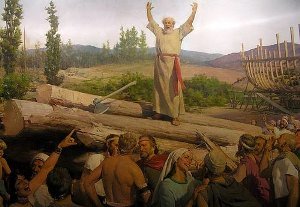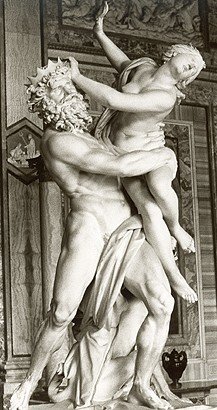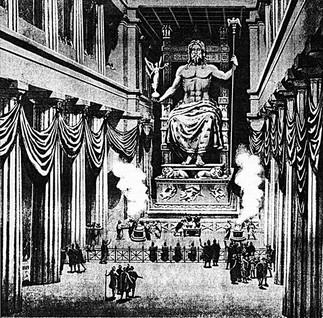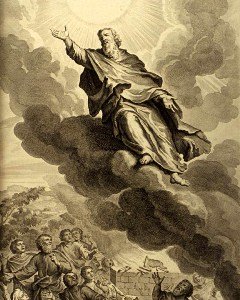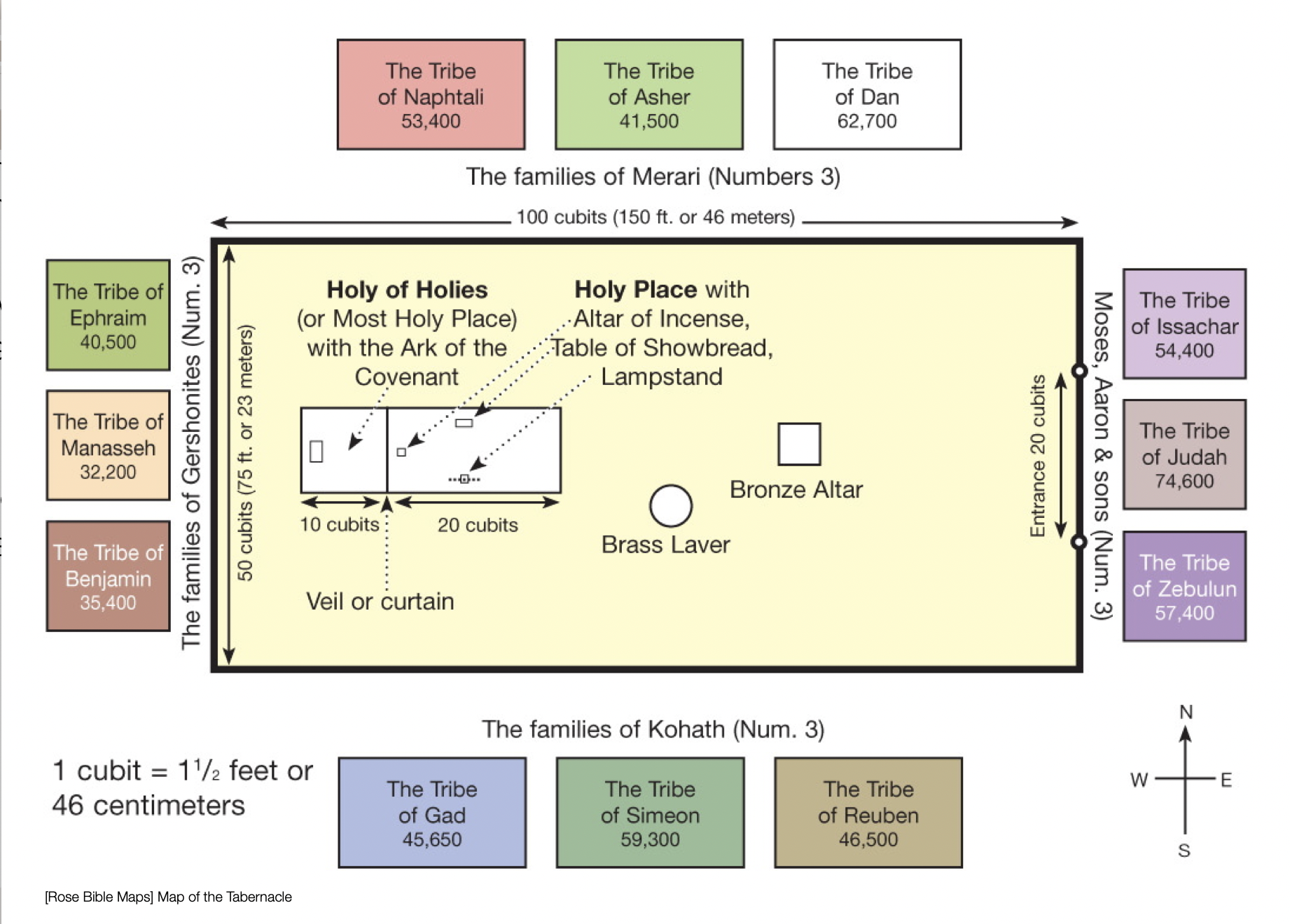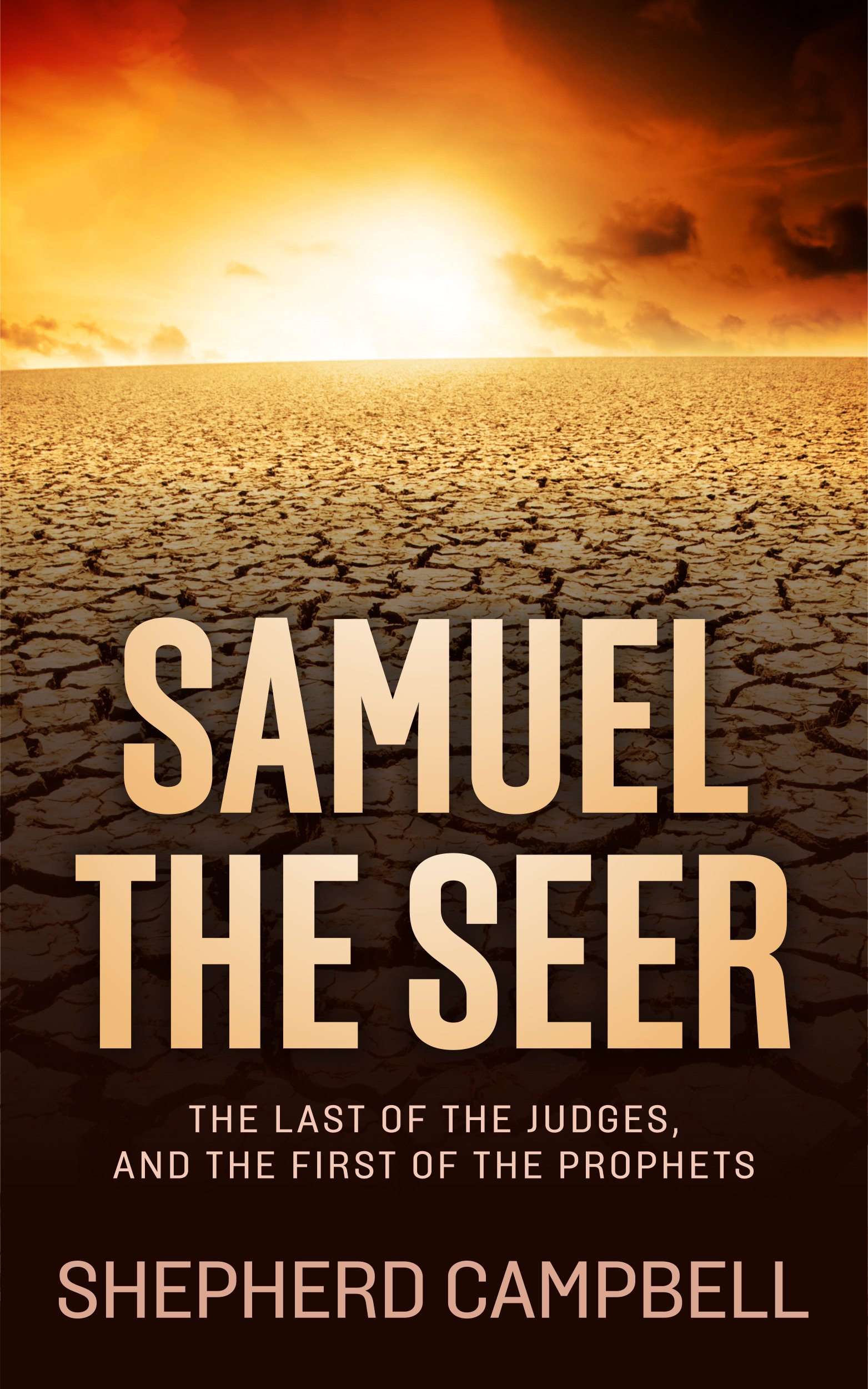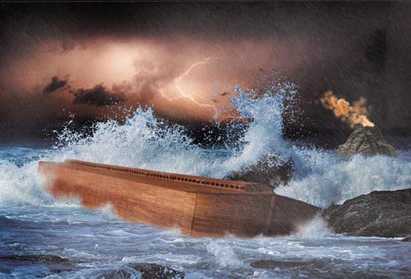VISIT OUR FACEBOOK PAGE!
The Story of Noah
The Story of Noah
Throughout the history of the Old Testament strange events have taken place and been recorded. Matthew 24:37 utters a looming prophecy. It reads:
"As the days of Noah were, so the coming of the Son of Man will be."
These were very strange and unique days. The passage containing the story of Noah can be found in Genesis 6. This chapter has been closely tied with the Book of Enoch.
The connection between Enoch and Noah can be found in Genesis 5:21-29. These early chapters in Genesis, culminating in the days of Noah, are some of the most mysterious chapters in all of the Bible.
The genealogy in Genesis 5 provides the line of descendants from Adam to Noah. The chapter is called "the book of the generations of Adam".
It provides a remarkable glimpse into one aspect of the story of Noah. According to Genesis 5:28, Lamech was 182 years old when he had Noah. This placed Noah's birth 1,056 years after Creation.
Adam had died a mere 126 years before Noah's birth. Enoch, Noah's great-grandfather, had been taken up by God 69 years prior to Noah's birth.
Remarkably, Seth, Adam's son, had died only 14 years before the birth of Noah! The story of Noah dates back to the most ancient of days.
This means that every Patriarch mentioned after Seth was alive during the days of Noah. This was an amazing line of Godly, righteous men. The most righteous men on earth in their day.
This family included, in order from oldest to youngest; Enosh, Kenan, Mahalel, Jared, Methuselah, Lamech, and Noah. The days of Noah seemed to be marked by a direct line of descendants in existence from Adam. Enosh was the grandson of Adam. This line culminated in the birth of Noah.
Genesis: 5:29 depicts Noah's birth, and Lamech's prophecy concerning his newborn son.
"Now he called his name Noah, saying, 'This one shall give us rest from our work and from the toil of our hands arising from the ground which the Lord has cursed."
The phrase translated as, "give us rest", in the Hebrew literally translates as, "to draw the breath forcibly". The act of heavy breathing in Hebrew, is used as a physical display of one's feeling.
This feeling was usually associated with either sorrow, compassion, or comfort. Lamech foretold Noah as being God's messenger of the promised "seed of the woman" to the New World.
The days of Noah leading up to the flood were marked by immorality of every sort. Never before in Ancient Israel had ungodliness prevailed to such extremes.
Careless attitudes towards the sanctity of sex, and marriage, plagued this morally bankrupt generation.
Jesus Christ remarked in the New Testament about these conditions when He said that people were "marrying and giving out in marriage". This phrase indicates a lax attitude about the construct of marriage, seen in our society today. All respect for the commands and words of God had been lost.
In fact, Genesis 6:2 says that the, "sons of God saw the daughters of men that they were fair; and they took them wives of all which they chose".
It is interesting to note that the Hebrew word for "wives" means "woman", regardless of whether she was married or not.
The phrase "sons of God" has been debated by scholars of Ancient Israel for years, and a number of different views and theories have arisen as to what exactly this passage is saying.
The Hebrew phrase, "bene elohim", is used in this passage. The exact same phrase is used 3 other times in the Old Testament, all in the ancient Book of Job (1:6, 2:1, 38:7). Each time it undoubtedly refers to angels.
This passage in Genesis, when viewed in context with other scripture, lends itself to suggest that angels descended from heaven. They then took any woman they pleased, and had intercourse with them.
This union produced giants, and beings of exceptional strength
and power. This was the view held by Ancient Israel's oldest and most
respected writers. They had no doubt the story of Noah included powerful and divine beings, fallen from Heaven and wreaking havoc and mayhem upon the earth.
Satan had not forgotten that God promised a "seed of the woman" would one day destroy him. Satan and his host then attempted to completely corrupt the "seed of the woman". These sons of God came to be known as the Nephilim.
We are told the earth was filled with violence. Satan and the Nephilim achieved enormous success in polluting the "seed of the woman". The story of Noah occurs when the earth was in a state of anarchy and terror. God looked upon the earth and "it repented the Lord that he had made man."
God's heart was "grieved", and He announced His judgment upon the whole earth, and all that was on it. He would destroy everything by a flood.
Study Resources
The Epic of Gilgamesh stands as one of the world's most significant pieces of literature, dating to the third millennium B.C. It, too, tells of a world wide flood, eerily similar to the story of Noah. Some scholars feel Enkidu may in fact be Enoch. The connections between Israel and Mesopotamia are deeply rooted.
THE STORY OF NOAH
"But Noah found favor in the eyes of the Lord." -Genesis 6:8
"By faith Noah, when warned about things not yet seen, in holy fear built an ark to save his family. By his faith he condemned the world and became heir of the righteousness that comes by faith." - Hebrews 11:7
Throughout Ancient Israel, both Old Testament and New Testament authors alike recognize the tremendous influence the faith of Noah has had on this world.
Despite the wickedness, the story of Noah includes some of the most righteous men the world has ever known. These men were contemporaries!
Noah would have learned from them, and heard first hand accounts of Adam's interactions with God. God was moving in a mighty way as well, during those early, dark days.
Ezekiel twice mentions Noah as one of the three most righteous men in history. (Ezekiel 14:14; 14:20)
What made Noah so remarkable was his quickness to exercise that faith through action. Genesis 6:22, 7:5, 7:9, and 7:16 all state that Noah "did all that God commanded him".
To be blameless in Noah's generation required an extraordinary amount of faith and discipline. In fact, God saw this need, as Noah was the only man since Enoch that is said to have "walked with God" (6:9).
The chronology involved with the story of Noah is fascinating. Enoch was 65 when he had Methuselah, Noah's grandfather. Scripture tells after he had Methuselah, he walked with God for three hundred years.
After this time, he was taken up by God, only one of two men in the Bible to never die. In the Book of Enoch, Enoch is given a vision ensuring the safety of his soon to be great-grandson Noah. Sixty nine years after Enoch was taken up, Noah was born.
God then resumed His walks on earth with man. He chose to walk with Noah. God used these walks to energize Noah, and strengthen him in his faith.
So when God told Noah to go build an ark over 400 feet long, Noah didn't hesitate:
"Thus did Noah; according to all that God commanded him, so did he" - Gen. 6:22
In the Book of Enoch, God sends the angel Uriel to Noah initially. Noah is told to take his family and flee the land, for both his safety, and the safety of his family. Noah, thus flees with this family, and hides out, escaping the wrath of the fallen Watchers an the Nephilim. It may have been during this exiled period which God instructed him to build the ark.
Noah, Shem, Ham, and Japheth, along with the rest of Noah's family, were to enter the Ark when God gave the command. Genesis 6:3 pronounces the Lord's judgment and warns man his days "will be a hundred and twenty years".
Scripture does not record when God gave Noah the command to begin building the Ark, but it was sometime after this warning. God had to give Noah ample time to build such an enormous structure.
Not only was Noah carrying the future of Ancient Israel, but he was carrying the future of the animal kingdom as well. The story of Noah reveals the destruction of all life.
Interestingly, the Book of Enoch claims the Nephilim had overtaken the animals as well. They had murdered and killed them at will.
It is not unlikely to imagine they had corrupted the animal genetic strain as well. This may shed some light on the special mention of Nimrod , being a mighty hunter.
Henry M. Morris took the cubit feet of the ark, and compared it the size and carrying capacity of modern day livestock box cars.
Based on his estimation, the ark could have carried 125,000 adult sized sheep. Time was needed to build such a huge vessel. Noah's work crew was probably limited to his 3 sons and their families. It is quite probable that work on the Ark lasted nearly the entire 120 years leading up to the Genesis flood. In verse 17 God tells Noah He is going to bring a "flood of waters upon the earth, to destroy all flesh".
It is interesting to note the Hebrew word used here for "flood".
In all of Ancient Israel the word mabbul, is used only in conjunction with the Noahic Flood.
The story of Noah speaks of the mabbul unique to all of history. It would destroy the entire earth, and all living things upon it.
Never again would a flood accomplish such massive, wide scale, and complete destruction. In fact, this word is related to an Assyrian word meaning, "destruction".
Share Your Thoughts On Noah & the Flood!
Do you believe the flood in Genesis really happened? How long do you think it took Noah to build the ark? Click on the link above to give us your insight, thoughts, comments, and questions!
The only other use of this word outside of Genesis is in Psalms 29:10, where God is said to sit "enthroned over the flood".
When Jesus is preaching in the New Testament about the flood of Noah, the word He uses is translated in the Greek "kataklusmos", as opposed to the normal Greek word for flood.
Throughout Genesis 6 God encourages Noah and his family by making a covenant with him. The Noahic Covenant was God's promise to Noah that because of his faith and obedience, God would protect and care for Noah and his family.
As is the case with God, the details of this covenant are not given immediately. God instead focuses on the present, and gives Noah the instructions for the animals that are to be boarded.
God gives Noah a two-minute-warning of sorts in Gen. 7:4. He tells Noah;
"For yet seven days, and I will cause it to rain upon the earth forty days and forty nights."
These last seven days were probably meant for Noah and his crew to make last minute preparations, get all the animals situated into their stalls, organize the food supply, and other such details a long voyage might require.
In the last of the pre-flood days of Noah, it is not unlikely to think he would have attempted one last effort to reach the wicked of his generation. If he did, it was to no avail. The Biblical flood was imminent.
Back to the Story of Noah
Back to Ancient Israel
Back to Home Page
Recent Articles
-
The Tabernacle of Moses
Feb 19, 25 09:50 AM
The tabernacle of Moses was built by Moses, per instruction from God, during the Exodus out of Egypt. It represented God's presence amongst His people. -
The Ark of the Covenant
Feb 19, 25 09:46 AM
The Ark of the Covenant is one of the most mystifying objects in all of human history. It's power was so great that Israel often carried it to the front lines. -
King David of Israel
Feb 19, 25 12:51 AM
The story of King David of Israel is a rags-to-riches tale of the family runt rising to national King. King David would become Israel's greatest king. -
The Nephilim
Feb 15, 25 10:35 PM
Were the Nephilim byproducts of fallen angels and women? Enoch wrote it was so, as did Moses. What mysteries lie buried in the pages of the Old Testament? -
In the Days of Noah
Feb 15, 25 10:32 PM
Jesus stated that in the last days it will be as in the days of Noah. The days of Noah were some of the strangest the world has ever seen.
SAMUEL the SEER
Now Available in Print & eBook on Amazon!!
POPULAR TOPICS
Learn more about these popular topics below. The Bible is full of fascinating stories, characters and mysteries!
BIBLE MAPS
Explore the land of the Old Testament! View these maps of the Bible.
